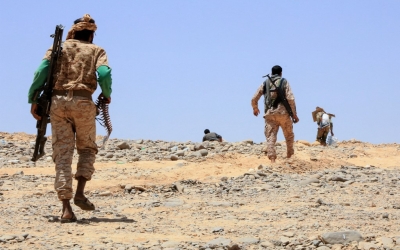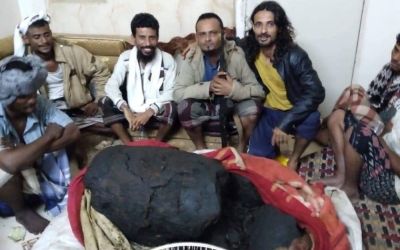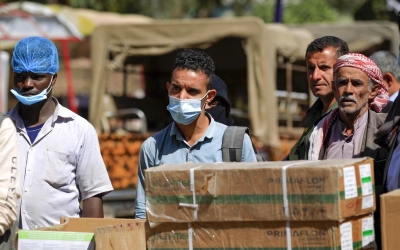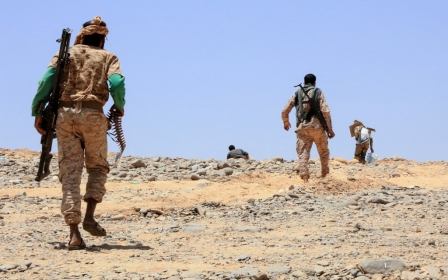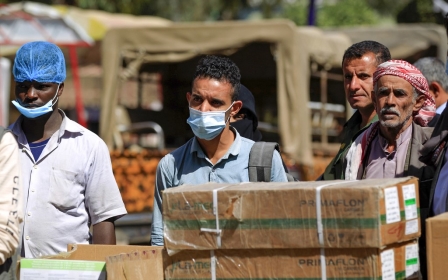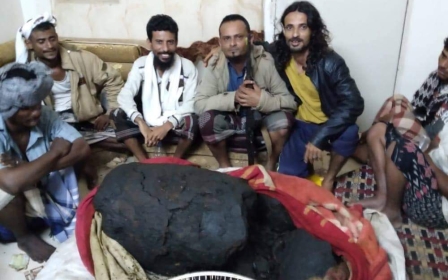Entisar al-Hammadi: Yemen's missing model to be questioned by prosecutors
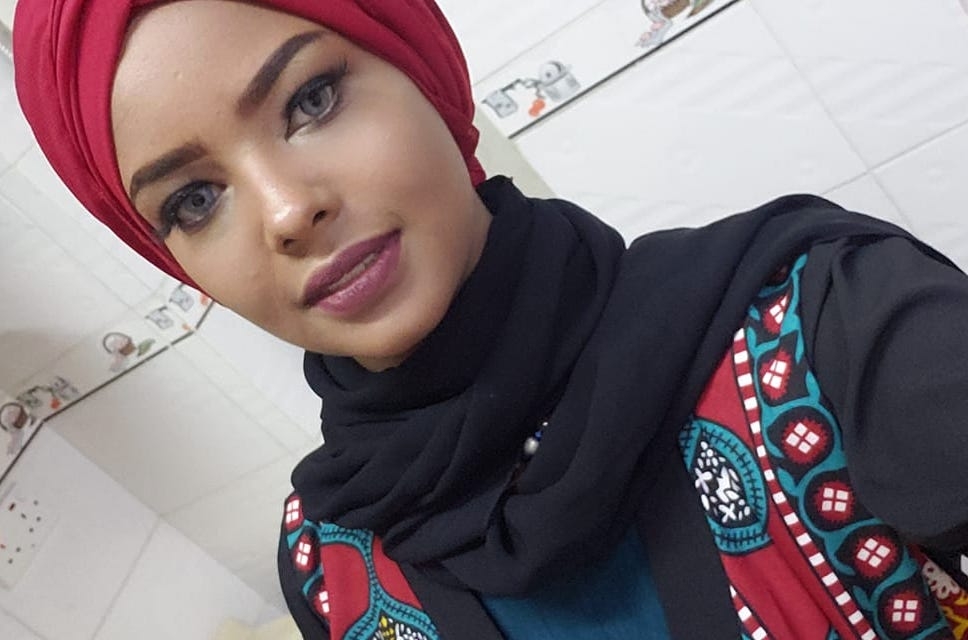
More than a month after the disappearance of Entisar al-Hammadi, a high-profile 20-year-old Yemeni actress and model who went missing along with two other women in Sanaa, a city controlled by rebel Houthis, little was known about her plight until Friday.
However, a close friend of Hammadi, speaking on condition of anonymity for safety reasons, has told Middle East Eye that Houthi authorities say public prosecutors will question Hammadi on Sunday and bring forward possible charges against her.
Social media activists, including Yemeni Feminist Voice, have accused the Houthis of arresting Hammadi because of her work as a model.
The friend said she did not know what charges might be brought against Hammadi, who would be accompanied by her lawyer, Khaled Mohammed Al-Kamal, but that this would become clearer on Sunday.
She said that Hammadi's mother had denied all accusations against her daughter and had called on the Houthis to release her.
Prior to Friday's announcement, none of Hammadi's relatives had talked to the media and there had been no information about the three women's whereabouts, even regarding the exact day they disappeared.
Last week, another friend of Hammadi, also speaking on condition of anonymity for safety reasons, told MEE: "We don't know anything about them until now."
Rumours about the case had been doing the rounds on social media, and the second friend said she also believed Hammadi had been kidnapped by the Houthis, a rebel group fighting Yemen's internationally recognised government in the country's six-year civil war.
"I think that she was arrested because of her work," the friend added, referring to the Houthis' conservative stance on the role of women.
'Heinous crime'
A campaign launched by social media activists with the hashtag "Freedom for Entisar al-Hammadi" had drawn attention to Hammadi's plight, and the Yemeni government issued a statement on 12 April condemning Hammadi's alleged detention.
Moammar Al-Eryani, the minister of information, culture and tourism, said: "This heinous crime confirms the crimes of kidnapping women by the militia in their areas [the majority of the population now live under Houthi-control] and reflects that [that] isn't personal behaviour but is organised work.”
He stated that Hammadi and two actresses were kidnapped while on the way together to film a TV series for Ramadan.
He called on the international community, US and UN envoys to Yemen and women's organisations to condemn this "crime" and to pressure the Houthis to release the women.
'It is against Islam'
In a country where rights for women rank among the worst in the world, Hammadi's choice of career path ruffled some feathers.
"My ambition is to leave this country and become an international model," she said last year. "Some of the obstacles I face are that I live in a conservative society and the customs and traditions."
Hammadi, who featured in several TV shows last year, says her childhood dream was to be either a model or a flight attendant.
"My family rejected this in the beginning, but I told them 'that is my dream and I will achieve it one day'," she told Manasati30 in October 2020.
Manasati30 supports a Facebook page which it says provides a free space for Yemeni youths between 15 and 30 to exchange views regardless of their cultural, social and regional backgrounds.
While some vocal campaigners have come out in support of Hammadi, many Yemenis see her work as unacceptable.
"We are Muslims, and we can't accept the work of models in our society as it is forbidden in Islam," Ashraf, a Sanaa resident, told MEE.
Ashraf's view typifies the attitude of conservative Yemenis, who reject what is perceived as "foreign culture" in their society.
Such work is "destroy[ing] Yemeni culture - it is against Islam," said Ashraf.
Accusations of xenophobia and racism
Yemen, which has the world's biggest gender income gap and no female government ministers, has for years been at or near the bottom of the World Economic Forum' Global Gender Gap index.
In 2019, it was "one of the worst places in the world to be a woman," according to Amnesty International.
"I was shocked to see some people defending the work of models in Yemen as if we are in a foreign country - shame on them as Yemenis," said Ashraf. "We should reject such culture.
"We need the government to focus on paying salaries and working on other issues and forget about models.
"I'm not supporting detaining models or actresses," he added, "but I'm talking about our customs and traditions and what is unacceptable."
The case of Hammadi, whose mother is Ethiopian, has elicited some of the same xenophobia and racism she has spoken out against.
In a video circulating on social media after her disappearance, Hammadi tells a presenter on a Yemeni show aired on a pro-Houthi TV channel that "racism related to my colour... is something I face, up until today."
Ashraf said: "I can't imagine that a Yemeni family would allow their daughter to work as a model, so I think this came to us from abroad.
"We need to keep our customs and focus on productive work that can serve us and our country instead of meaningless jobs."
A feminist activist in Sanaa, speaking on condition of anonymity for safety reasons, told MEE: "Not only Hammadi, but many Yemeni women who are from Ethiopian mothers face racism in Yemen, and this is the culture here.
"Even Yemeni dark-skinned women face discrimination, but the strong ones who are confident of themselves overcome such things."
Why Hammadi?
Some feminist activists wrote about the alleged detention of Hammadi by the Houthis on 11 April, more than a month after she disappeared.
But until now Houthi authorities have not commented on the accusation that they were linked to Hammadi's kidnapping.
Some Yemenis wonder why Hammadi and her two colleagues were allegedly detained and not any other actresses.
"There are many TV series nowadays in Ramadan, and there are dozens of other actresses taking part and working from Sanaa and other Houthi-controlled areas. So the question is why was it only Hammadi [and the two actresses] who was kidnapped?" Mohammed, a Sanaa resident, told MEE.
"I think there is a personal problem with Hammadi herself and not with her work as an actress."
Mohammed said he is wary of the rumours about the case, accusing the government of wishing to discredit the Houthis by saying they were behind the kidnapping, and that no-one really knows the truth.
"In Yemen, not only people but also the government is politicising anything," he said.
"Political people don't care about anything, but they try to exploit any issue to serve their political purpose. I hope [Hammadi] and her colleagues breathe the air of freedom soon."
Hammadi's second friend told MEE that she was kidnapped because she has a way of life that authorities in Sanaa won't accept.
"The Houthis consider working as actress and model to be haram [forbidden], so it is normal they detain open-minded people," the friend said.
Middle East Eye propose une couverture et une analyse indépendantes et incomparables du Moyen-Orient, de l’Afrique du Nord et d’autres régions du monde. Pour en savoir plus sur la reprise de ce contenu et les frais qui s’appliquent, veuillez remplir ce formulaire [en anglais]. Pour en savoir plus sur MEE, cliquez ici [en anglais].


